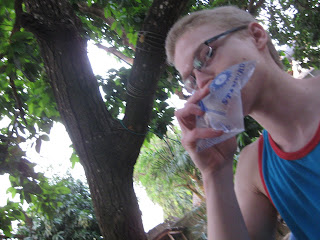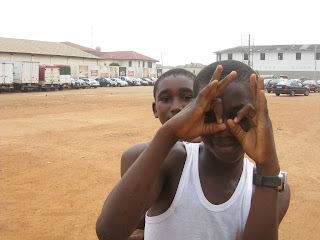07/22/13
I want to
go over some things about Ghana that will help give a clearer picture of what
life is like here in Accra and allow an appreciation of the oddities that make up
Ghanaian culture from an American perspective. Also, I stole this idea from
Zoey, who is the visionary behind this blog post.
· - “I
know your mother” is actually a potential threat here. Social justice can often
be taken into hands of society instead of left for policemen.
· - Civilian
Justice happens regularly. When someone commits a crime, people who witness it
get angry and often violently intervene. I was told by one of the CIEE staff
that those caught stealing at a market we went to (the largest market in
western Africa) would be seized and lynched—no wonder crime rates are so low
here. My host uncle told me about a time he was driving and saw someone hit an
old man biking with their car then drive away. He drove after the guy until he
stopped and got out of the car then chased after him on foot. When he caught up
with him, he and other passerby’s beat him ruthlessly before taking him to the
police station.
· - About half the cops you run into on the streets
are packing an ak-47.. hope they’re on your side.
· -People carry random stuff on their heads to
transport or sell it. (men and women)
·
-Religious
references are absolutely everywhere, on the back of trotros and taxis and in
the names of various businesses. (ex. God Knows Supermarket; Blood of Christ
Hair Salon; Righteous Art; God First Refrigeration) It is by far the most
outwardly religious country I have seen.
· -Random people on the street yell “obruni” at
white people, especially little kids
· -There are strange non-alcoholic malt drinks sold
commonly (and drinks named after pants)
· -When people say I’m coming, they’re usually
actually walking away from you.. but are coming back soon.
· -Many public bathrooms don’t have toilet paper.. better
bring your own with you
· -It is seen as rude to do anything remotely
social with the left hand, including waving, shaking hands, giving something to
someone, and eating finger food.
· -PDA is almost non-existent (I don’t think I’ve
seen any couples holding hands or kissing in public)
· -Hissing or making kissing noises at people to get their attention is not
seen as rude.
· - Eating your food before others are served is
totally acceptable and expected.
· -Every cab that passes a white person will honk
at least 3 times at him/her
· - Credit needed for cell phone use is bought in
the form of cards with scratch-off codes on them from street vendors.
· - Most people refer to others as family members
even when they are not actually related, making it very confusing figuring out
who are blood-relatives. Our host mom and dad refer to the other people living in our house as family even though none of them are actually related.
· - If you do not greet someone, you may find them
unhelpful or go so far as to give you a cold shoulder, but if you do, you may
receive more help than you ever would have asked for. (someone I greeted paid
for my friends and I on a trotro; a wood carver gave me a wooden mask for
talking to him for about 5
·
-water is
sold in plastic bags called sachets
· -Motorcycles go just about wherever they want on
the road and use the dashed lines in between lanes as their personal lane.
· -Many households include extended family members
and even random people who are taken in as family
· - There are many symbols used in Ghanaian art and
architecture with specific meanings (the most popular of these representing
God’s omnipotence; this symbol is on the majority of plastic chairs I’ve seen)
· - Getting a bill at a restaurant takes a very long
time if you don’t ask for it.
· - I really like this one: tipping
waiters/waitresses is OPTIONAL and is only done when you feel like it has been
earned, which makes so much more sense.
· - It is rude not to accept food from someone who
offers it to you or in any way question how good the food is, including
smelling it.
· -Some foods like banku and fufu are eaten with
the hands. They are doughy and usually eaten in soups (you roll up a ball of
dough, dip it and the soup, and swallow it without chewing).
· -Certain titles are highly valued and expected to
be used in just about all situations (military captain, doctor, professor, etc.)
· -Some things seem to have gotten lost in
translation when it comes to Ghanaian English. We saw multiple trucks carrying
gas that had “highly inflammable” written on the back. Also, we went to a
restaurant that had homos on the menu (and homos with minced meat). I don’t
think that was what they were going for.
· -Ghanaian English follows British English in
certain ways: glasses are called specs, pants means underpants (actual pants are
called trousers), and plastic bags are called rubbers (don’t be surprised if
someone asks whether you want a rubber after you buy something).
-
-People in Ghana call each other "Charlie" (sounds more like chahlee or chahlay) in a similar way that we use dude.-People often make sound effects like an animated "oh"or "hey" usually to portray empathizing with someone's pain. Ex. Me: Mame my dog died. Mame: Oh! Kyle.. Hey! That is sad.






















